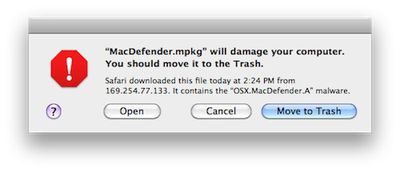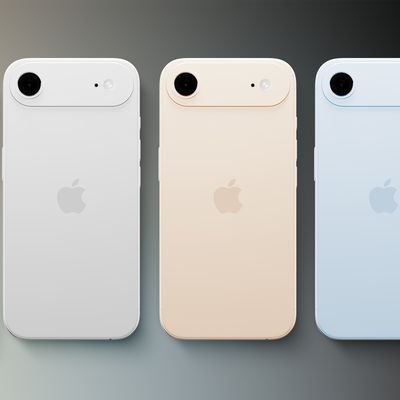Raid on Russian Firm May Have Taken Down MacDefender Malware
MacDefender was the most significant malware attack on the Mac in years, if ever. The threat started in May, infecting many less-savvy Mac users, and had become widespread enough that Apple was forced to release a special anti-malware security fix. The software would be downloaded when users visited certain websites and, once installed, looked to be legitimate anti-virus software. Unsuspecting users would get warnings of viruses infecting their system. By entering their credit card number, users could pay to "remove" the viruses.
Except it was all fake. There were no viruses, just a piece of software trying to trick users into handing over their credit card numbers.

The hidden developer behind MacDefender continued to release new variants of the malware into the wild, resulting in a cat-and-mouse game as Apple continued to ban new variants of the software.
Then, one day, MacDefender simply disappeared. Richard Gaywood, at TUAW, pointed out that Apple hadn't updated its malware definitions -- the code designed to kill MacDefender -- since June 18.
Brian Krebs might have the answer:
On June 23, Russian police arrested Pavel Vrublevsky, the co-founder of Russian online payment giant ChronoPay and a major player in the fake AV market.
[...]
In May, I wrote about evidence showing that ChronoPay employees were involved in pushing MacDefender — fake AV software targeting Mac users. ChronoPay later issued a statement denying it had any involvement in the MacDefender scourge.
But last week, Russian cops who raided ChronoPay’s offices in Moscow found otherwise. According to a source who was involved in the raid, police found mountains of evidence that ChronoPay employees were running technical and customer support for a variety of fake AV programs, including MacDefender.
The last release of MacDefender occurred on June 18. ChronoPay's offices are raided June 23. A coincidence perhaps, or Russian law enforcement saving Mac users from fake antivirus software.
Popular Stories
Apple will launch its new iPhone 17 series in two months, and the iPhone 17 Pro models are expected to get a new design for the rear casing and the camera area. But more significant changes to the lineup are not expected until next year, when the iPhone 18 models arrive.
If you're thinking of trading in your iPhone for this year's latest, consider the following features rumored to be coming...
A new Apple TV is expected to be released later this year, and a handful of new features and changes have been rumored for the device.
Below, we recap what to expect from the next Apple TV, according to rumors.
Rumors
Faster Wi-Fi Support
The next Apple TV will be equipped with Apple's own combined Wi-Fi and Bluetooth chip, according to Bloomberg's Mark Gurman. He said the chip supports ...
Apple's next-generation iPhone 17 Pro and iPhone 17 Pro Max are only two months away, and there are plenty of rumors about the devices.
Below, we recap key changes rumored for the iPhone 17 Pro models.
Latest Rumors
These rumors surfaced in June and July:A redesigned Dynamic Island: It has been rumored that all iPhone 17 models will have a redesigned Dynamic Island interface — it might ...
Apple does not plan to refresh any Macs with updated M5 chips in 2025, according to Bloomberg's Mark Gurman. Updated MacBook Air and MacBook Pro models are now planned for the first half of 2026.
Gurman previously said that Apple would debut the M5 MacBook Pro models in late 2025, but his newest report suggests that Apple is "considering" pushing them back to 2026. Apple is now said to be...
iPhone 17 Pro and iPhone 17 Pro Max models with displays made by BOE will be sold exclusively in China, according to a new report.
Last week, it emerged that Chinese display manufacturer BOE was aggressively ramping up its OLED production capacity for future iPhone models as part of a plan to recapture a major role in Apple's supply chain.
Now, tech news aggregator Jukan Choi reports...
The long wait for an Apple Watch Ultra 3 is nearly over, and a handful of new features and changes have been rumored for the device.
Below, we recap what to expect from the Apple Watch Ultra 3:Satellite connectivity for sending and receiving text messages when Wi-Fi and cellular coverage is unavailable
5G support, up from LTE on the Apple Watch Ultra 2
Likely a wide-angle OLED display that ...
In select U.S. states, residents can add their driver's license or state ID to the Wallet app on the iPhone and Apple Watch, providing a convenient and contactless way to display proof of identity or age at select airports and businesses, and in select apps.
Unfortunately, this feature continues to roll out very slowly since it was announced in 2021, with only nine U.S. states, Puerto Rico,...
The iPhone 17 and iPhone 17 Air will be available in a total of nine color options, according to new information coming out of Asia.
The iPhone 17 Air's expected color options.
According to the leaker going by the account name "yeux1122" on the Korean blog Naver, accessory manufacturers are now producing camera protector rings for the iPhone 17 and iPhone 17 Air in colors to match their...





















